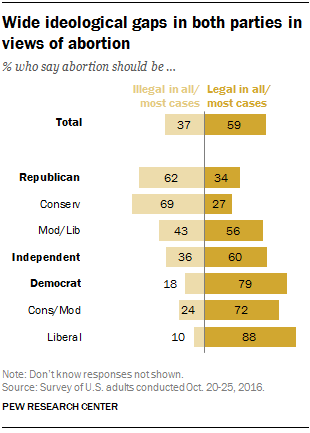Ohio exhibits continued division over abortion rights

PEW Research Center
This graph depicts the ideological division regarding abortion.
Editor’s Note: Samantha Durham is a senior at UNCW studying sociology. She is the Opinion Editor for The Seahawk and enjoys concentrating her work on social issues. All opinions expressed in this article are solely those of the author. Samantha may be found on Twitter @Durham_Sam. All suggestions and inquiries may be sent via email to [email protected].
We are living in arguably one of the most transformative times in history. In my lifetime, the first African-American President of the United States took office and same-sex marriage became legal.
However, with all positives usually come negatives. In my lifetime, I have learned about students dying in schools, people continuing to face abuse of all forms and heard of people being shot in the street for the color of their skin.
It is certainly fair to say the United States, while a land of freedom, is also a land of many troubles. While this is not our sole characteristic, it seems the political divide in this country has only driven us all further from each other. In a country of supposed unity, we are far apart.
Politics are not the sole cause of this divide. Social issues, fueled by political motive, do seem to include some major factors that turn us from a unified nation into a nation divided. This ranges from topic to topic, one of those being abortion.
Abortion in no way is a subject to take lightly. It’s arguably one of the hottest topics socially and politically in the United States right now and has been so for several decades. This can be seen in the way people talk about abortions, whether that be in jest or hostility.
Ohio recently brought abortion to the forefront once again, reminding us all how divided we are over the supposed right to live or die. House Bill 565 was proposed in March and provides a terrifying glance into the minds of those making America’s laws.
This bill was sponsored by state Rep. Ron Hood and Nino Vitale, along with 18 more House Republicans, reported NPR. However, Ohio is clearly divided in its stance on abortion, regardless of what this bill suggests.
HB 565, according to NPR, “would prohibit abortions in even the cases of rape, incest or danger to a woman’s life.” NPR also reported that “The proposal would allow criminal charges against both doctors and pregnant women seeking abortions and would characterize an ‘unborn human’ as a person under Ohio’s criminal code regarding the homicide.”
In short, this would mean doctors that offered or performed abortion services along with the pregnant women would be tried in court as criminals, opening them up to facing the same punishments to those convicted of homicide: the death penalty and life in prison.
This bill has received much scrutiny from pro-choice organizations, particularly NARAL Pro-Choice Ohio. According to the same NPR article, NARAL Pro-Choice Ohio is calling this bill “an obvious attempt to give the U.S. Supreme Court a chance to overturn Roe v. Wade.”
This is the same sad story we have all heard before. It also opens the door to the same debate we have listened to for as long as I can remember: is the life of an unborn human a life? If so, at what point does it become a human life?
The debate has divided those both in the social world and in politics. Ohio proves to be a perfect example of the division America faces regarding abortion.
In 2016, Gov. John Kasich, a Republican, vetoed the “heartbeat bill” which would have banned abortions at the point a fetal heartbeat could be detected, reported NPR. For some, that may occur as early as six weeks into pregnancy.
This is just a glance into Ohio’s history of division over abortion rights. Ohio has a ban on abortions after 20 weeks that began in 2017.
This divide can be seen across the country, as ABC News reported that 43 states have bans on abortions at a certain point during a pregnancy. However, those time frames can vary by state.
The major question that comes to mind is this: what right does the government have to a human body? Pregnancy is, frankly, between the woman and those she chooses to concern it with. While I understand the fear of freeing the limits to abortion, I simply lose faith in American lawmakers when limitations are placed on a woman’s body, especially when a pregnancy occurred without consent.
The other big question I must pose to these Ohio lawmakers: what if one of these women impacted by this bill was someone close to you? Justice itself is challenging to define, but if a woman close to you was impregnated during a rape, is it truly fair to make her carry on the life of a child she did not want?
Furthermore, does this child not potentially serve as a frequent reminder of the trauma? Could it not be argued that maybe that child could be a reminder of something life altering?
I completely understand that the conceived child is not at fault for the sexual misconduct, but is it fair to force a woman into motherhood before she herself is prepared? The same question applies to potential mothers of children with serious illness, or pregnancies that pose serious illness to the mother herself.
I see the arguments of both sides and, while I lean closer to one side, I will be the first to say that abortions should not be given as if they are a reset button. Taking responsibility for one’s actions is completely fair, but the subject seems entirely situational.
Regardless of how I personally feel about the act of abortion, the laws dictating the bodies of women are unfair and immoral. The right to have a child should be a gift – not a political hot potato.
Overall, HB 565 is insensitive and clearly shows that some of our country’s leaders are not thinking of all parties involved, especially in this case. Forcing a woman to have a child that she did not consent to creating is barbaric and prehistoric.
Threatening to punish people for a legal procedure is unrealistic and it speaks to the lack of consideration for those that undergo traumatic experiences. Yet, in the United States, people continue to shame others for abortions and attack those that provide such services.
While this bill is not a clear attack on these groups, it sends a clear message that those ideas are not welcome in the state of Ohio. As a country, we remain divided on this issue like many others. However, maybe a nation of unity would be much more unified if we learned the meaning of compromise.
Neither side is not right or wrong. Both sides of the abortion debate have flaws in the same nature as gun control debates.
Perhaps coming together on an issue might result in more middle ground legislation instead of one-sided laws.






